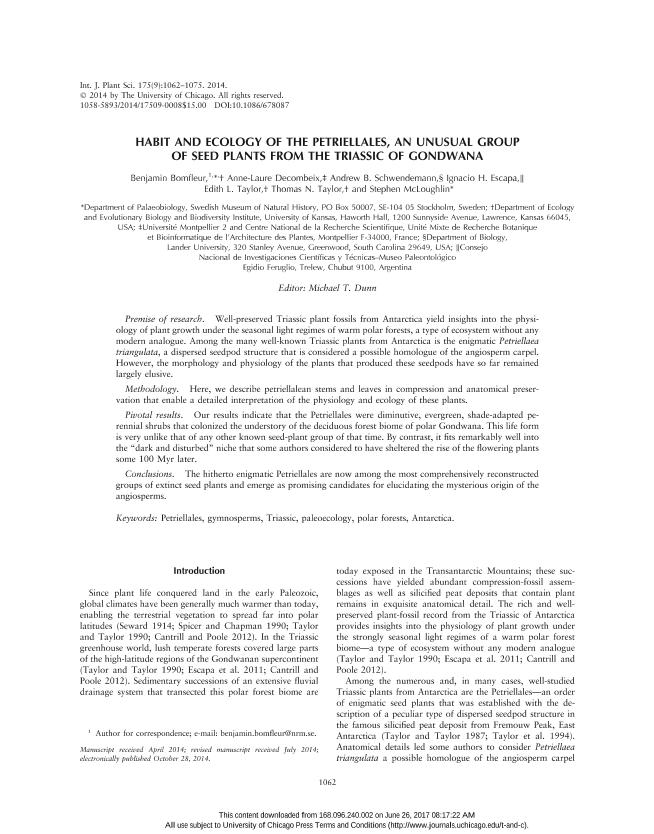Mostrar el registro sencillo del ítem
dc.contributor.author
Bomfleur, Benjamin
dc.contributor.author
Decombeix, Anne Laure
dc.contributor.author
Schwendemann, Andrew
dc.contributor.author
Escapa, Ignacio Hernan

dc.contributor.author
Taylor, Edith L.
dc.contributor.author
Taylor, Thomas N.
dc.contributor.author
McLoughlin, Stephen
dc.date.available
2017-06-26T15:18:25Z
dc.date.issued
2014-10-28
dc.identifier.citation
Bomfleur, Benjamin; Decombeix, Anne Laure; Schwendemann, Andrew; Escapa, Ignacio Hernan; Taylor, Edith L.; et al.; Habit and ecology of the Petriellales, an unusual group of seed plants from the triassic of Gondwana; University Of Chicago Press; International Journal of Plant Sciences; 175; 9; 28-10-2014; 1062-1075
dc.identifier.issn
1058-5893
dc.identifier.uri
http://hdl.handle.net/11336/18856
dc.description.abstract
Premise of research. Well-preserved Triassic plant fossils from Antarctica yield insights into the physiology of plant growth under the seasonal light regimes of warm polar forests, a type of ecosystem without any modern analogue. Among the many well-known Triassic plants from Antarctica is the enigmatic Petriellaea triangulata, a dispersed seedpod structure that is considered a possible homologue of the angiosperm carpel. However, the morphology and physiology of the plants that produced these seedpods have so far remained largely elusive. Methodology. Here, we describe petriellalean stems and leaves in compression and anatomical preservation that enable a detailed interpretation of the physiology and ecology of these plants. Pivotal results. Our results indicate that the Petriellales were diminutive, evergreen, shade-adapted perennial shrubs that colonized the understory of the deciduous forest biome of polar Gondwana. This life form is very unlike that of any other known seed-plant group of that time. By contrast, it fi ts remarkably well into the "dark and disturbed" niche that some authors considered to have sheltered the rise of the fl owering plants some 100 Myr later. Conclusions. The hitherto enigmatic Petriellales are now among the most comprehensively reconstructed groups of extinct seed plants and emerge as promising candidates for elucidating the mysterious origin of the angiosperms.
dc.format
application/pdf
dc.language.iso
eng
dc.publisher
University Of Chicago Press

dc.rights
info:eu-repo/semantics/openAccess
dc.rights.uri
https://creativecommons.org/licenses/by-nc-sa/2.5/ar/
dc.subject
Petriellales
dc.subject
Gymnosperms
dc.subject
Triassic
dc.subject
Paleoecology
dc.subject
Polar Forests
dc.subject
Antarctica
dc.subject.classification
Paleontología

dc.subject.classification
Ciencias de la Tierra y relacionadas con el Medio Ambiente

dc.subject.classification
CIENCIAS NATURALES Y EXACTAS

dc.title
Habit and ecology of the Petriellales, an unusual group of seed plants from the triassic of Gondwana
dc.type
info:eu-repo/semantics/article
dc.type
info:ar-repo/semantics/artículo
dc.type
info:eu-repo/semantics/publishedVersion
dc.date.updated
2016-11-23T19:39:41Z
dc.journal.volume
175
dc.journal.number
9
dc.journal.pagination
1062-1075
dc.journal.pais
Estados Unidos

dc.journal.ciudad
Chicago
dc.description.fil
Fil: Bomfleur, Benjamin. Swedish Museum of Natural History; Suecia
dc.description.fil
Fil: Decombeix, Anne Laure. Universite Montpellier II; Francia
dc.description.fil
Fil: Schwendemann, Andrew. Lander University; Estados Unidos
dc.description.fil
Fil: Escapa, Ignacio Hernan. Museo Paleontológico Egidio Feruglio; Argentina. Consejo Nacional de Investigaciones Científicas y Técnicas; Argentina
dc.description.fil
Fil: Taylor, Edith L.. University of Kansas; Estados Unidos
dc.description.fil
Fil: Taylor, Thomas N.. University of Kansas; Estados Unidos
dc.description.fil
Fil: McLoughlin, Stephen. Swedish Museum Of Natural History; Suecia
dc.journal.title
International Journal of Plant Sciences

dc.relation.alternativeid
info:eu-repo/semantics/altIdentifier/url/http://www.jstor.org/stable/10.1086/678087
dc.relation.alternativeid
info:eu-repo/semantics/altIdentifier/doi/http://dx.doi.org/10.1086/678087
Archivos asociados
